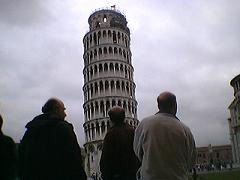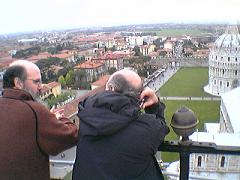April 29, 2003
Rotor Workshop Recap
Last week I promised to provide a summary of the last day of the Rotor Workshop that was held in Pisa, Italy. Unfortunately, wireless connectivity was available only until Thursday evening, and I missed the opportunity for a more timely update. Here's why:
 |
 |
Overall, the organization of the workshop was excellent. The location was superb, the food was perfect, and the participants, terrific. There were some notable absences, such as Jason Whittington and John Cough, who were on the original program. It was good to see Peter Drayton in his PM role and David Stutz in his 'I have no role' role.
- Thursday began with a keynote by Peter de Jong, who has been responsible for the design of the serialization and formatter classes in .NET (and SSCLI). Peter went into the details of the class designs by taking a historical look at their development. Many details, especially those on 'object fixups' were enlightening, as were the details about the performance of the different serialization and formatter engines.
- Most of the other presentations were status updates from the projects funded under last year's SSCLI CFP. In the section on Concurrency and Distribution, Raphael Guntersperger reported on extensions to C# to model activities and channels, and Arsland Volkan on the SCOOPLI library which is an implementation of the Eifel SCOOP model. In the Languages and Programming sessions, there were early reports about using Aspect-oriented programming with CLI and formal verification of a C#-light language.
- The first Thursday afternoon session was on graphics, where Frank Milan presented VTK.NET, which uses wrapper classes to expose the graphics library to CLI based programs, and Ivo Hanak, who is from the same group as Frank, presented work on an OpenGL interface.
- On Thursday, I gave the last presentation, which focused on benchmarking virtual machines for high-performance computing. ( I will write and entry about that later today or tomorrow.)
- Friday began with a panel on Rotor, Community and the Future. The panelists
were Antonio Cisternino, Peter Drayton and David Stutz, and I was the
moderator. Topics discussed:
- what process we need to have in place for the community to be able to influence the main rotor source code
- what is missing from the package to make rotor a better platform for application development.
I skipped the last session on Friday (sorry) to sit down with Peter Drayton and look in detail at the difference between the code emitted by the Everett and the Rotor JITs in an attempt to figure out the huge performance difference between the two runtimes. I'll report on this later.
Posted by Werner Vogels at April 29, 2003 01:12 PM